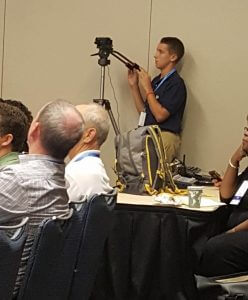Questions speakers need to ask to ensure their success
There are many questions speakers should ask their event organizer or meeting planner before they speak. It’s a regular call I make: a final check with a client about my upcoming program. I always ask what the audience needs to hear. Everyone has the same message, it seems. “We’re different. We have unique challenges when it comes to communications.” Yep. They’re different. Just like everybody else. While I don’t discount that there are differences that matter, the core message I am hired to deliver will play in almost every organization, city, and demographic I can imagine. I’ve seen this play out enough that my confidence is high and I’m sure we can pull this off.
But if I rest on that last sentence, failure is lurking. Remember that small print on all your financial statements: “Past success is not an indicator of future returns.” Just because others have received my program well does not mean that this client will approve. I’ve learned (please don’t ask HOW I’ve learned. This is a place for positive, feel-good stories!) to ask a few important questions of a meeting planner that could save the program from disaster.
Here are some of the questions speakers should have on their checklist regardless of how sure they are of their message:
Who’s in the audience?
This is the most important detail to understand. How many will be there? What are their expectations? What is their biggest pain? What is their motivation for being in the room? Are they interactive? Upset/grumpy? What will they be wearing? The whole first half of our content workshop is about understanding your audience. It should be the driving force behind everything a speaker says and does. The more you know about the audience, the better your talk can become.
What’s your definition of success?
This is my favorite question to ask. I want the person signing the check to state exactly what they see as a program worth their money. If they can’t articulate what success looks like, then I know that they trust me, but there is also WAY too much leeway in our assignment. I then will help them find the problems I will help them solve. I don’t want to just “be a speaker” – I want to be a trusted advisor making them better, ostensibly with communication, but often much more. If success isn’t discussed, then it’s unlikely there will be met objectives.
There are practical questions worth asking, too:
What’s the room layout?
While I would argue (and teach) that a speaker should be able to adapt to any situation, there are some layouts that are better than others. If there’s a meal involved, there will frequently be lots of distractions, which is a whole different set of problems from rows of seats in a conference ballroom.
I frequently ask the meeting organizer to take two pictures and send them to me: one from where they think I’ll be standing and one from the back row of the audience facing back towards the front. Those two photos can tell me all I need to know on what will and won’t work with regards to movement, audience participation, and distractions.
What’s the audio/visual setup?
Bad sound can scuttle a presentation/speech/talk in no time. Is there a mic? Is it a lapel, hand-held, or over-the-ear? Is there someone on call that can help when (not if), the audio begins to go bad? Side note: Regardless of what you’re told, bring your own mic, spare batteries, and remotes – don’t risk someone else’s incompetence to mess up your talk. And a Starbucks gift card for the AV guy isn’t a bad idea, either.
Is the projector mounted, or on a table with a beam I’ll have to walk through? Is the aspect ratio 16×9 or 4×3? What is the “normal” style of presenting the audience is used to seeing? (Hint: search the web for past presentations and you can get an idea.) Is a flip chart available?
Is it being videotaped?
I don’t want the client to broadcast my speech to places I cannot control. I usually restrict video use to inside the organization that hired me and only for a limited amount of time. But I also ask for a copy of the video. The first reason is that I want to evaluate my performance and video is the only way to do that. But I also may want to use clips from the talk to pass on to other prospective clients. The best way to prove you can speak is to show yourself speaking. A demo video is a must for any prospective speaker.
And a few questions I ask (again) on the day of the program
How much time do we have?
This seems obvious, as they surely told you when you signed the contract. But things change and guests are given program time. Before I take the stage, I ask, “What is the absolute, drop-dead time that people will want me off the stage?” I don’t accept, “Oh, they’ll love you, take whatever time you need.” People do NOT ever (EVER!) want the speaker to run over. So you MUST finish on time. Which means you MUST know what the end time really is. Have a mechanism for shortening your talk when (not if) the speaker in front of you runs over. Bring a clock or iPad to display the time so you know.
Where am I in the program?
Who is before me? Who is after me? What does the transition/segue look like? Who will introduce me (have a bio sheet ready for them, and get to know them so they have something personal to add)? Who do I hand the program back to?
This is not a comprehensive list, to be sure, but it’s a great start to assure that you will not embarrass yourself as the “guest speaker.” And please note this list says nothing about the legal issues of travel, payments, and contract. This is about you being the best you can be on stage and having a message that resonates in every audience member’s mind.
Got additions? What have you found successful in securing those speaking gigs with questions speakers should ask?
Related blog: Top 3 Mistakes Conference Speakers Make and 3 Easy Fixes
Communication matters, what are YOU saying?
This article was published in the May edition of our monthly speaking tips email, Communication Matters. Have speaking tips like these delivered straight to your inbox every month. Sign up today and receive our FREE eBook, “Twelve Tips that will Save You from Making a Bad Presentation.” You can unsubscribe at any time.






